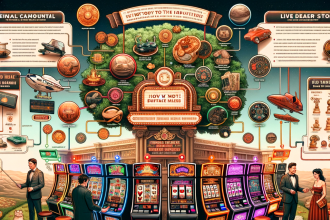The growth of online casinos has been swift and transformative, creating a multi-billion dollar industry that appeals to millions worldwide. To keep players engaged and returning for more, online casinos are increasingly turning to gamification—the application of game-design elements in non-game contexts. This strategy includes features such as points, leaderboards, badges, and interactive storytelling, aiming to create an immersive experience. However, the question arises: Is this gamification enhancing the fun of online gambling, or is it simply a manipulation tactic to increase player spending and time on the platform? This article delves into the allure of gamification in online casinos and the ethical considerations surrounding its use.
The Allure of Gamification: Enhancing Player Engagement
Creating an Immersive Experience
Gamification introduces elements that transform ordinary gambling into a more interactive and engaging experience. For example, players can earn loyalty points for every bet placed, which can be redeemed for bonuses, free spins, or even real money. This system not only encourages players to spend more time on the platform but also fosters a sense of achievement as players progress through levels or unlock rewards. The excitement of reaching a new tier or completing a challenge can turn the act of gambling into a personalized adventure.
In many instances, casinos use story-driven games that immerse players in a narrative. For example, themed slot machines might transport players to a fantasy world, complete with characters, quests, and visually appealing graphics. These elements make the experience not just about winning money but also about enjoyment and escapism, tapping into the psychological triggers that make games addictive.
Fostering Community and Competition
Another allure of gamification lies in its ability to create a sense of community among players. Features such as leaderboards highlight the achievements of top players, promoting a competitive spirit. This can encourage casual players to engage more frequently, striving to improve their rankings. Tournaments that pit players against one another for prizes amplify this competitive edge, making the experience social rather than solitary.
Furthermore, social features like chat functions and forums allow players to communicate, share strategies, and celebrate wins together. This sense of belonging can enhance player loyalty and satisfaction. The combination of competition and camaraderie can lead to longer gaming sessions and increased spending, making gamification an effective strategy for casinos.
Enhancing Retention through Rewards
Online casinos are increasingly using gamification to enhance player retention through structured reward systems. By implementing a tiered loyalty program, players can gain access to exclusive bonuses, more significant rewards, and tailored incentives that cater to their gaming preferences. This structured approach not only keeps players engaged but also ensures they feel valued and appreciated for their patronage.
Casinos can further enhance this experience by offering customized rewards based on gameplay behavior. For example, if a player frequently plays slots, they might receive a special bonus on their next slot machine game. This personalized touch can lead to increased player spend and satisfaction, creating a win-win situation for both the casino and the player.
| Gamification Feature | Purpose | Player Benefits |
|---|---|---|
| Loyalty Points | Encourage continuous play | Earn rewards and bonuses |
| Leaderboards | Foster competition and community | Recognition and social interaction |
| Custom Rewards | Enhance player retention and satisfaction | Personalized experience |
Ethical Considerations: Fun or Manipulative Tactics?
The Thin Line Between Engagement and Manipulation
While gamification can undoubtedly enhance the player experience, it raises ethical concerns regarding its potential for manipulation. Some critics argue that strategies designed to increase player engagement often exploit psychological triggers associated with addiction. By leveraging these triggers, online casinos may encourage excessive gambling behaviors, which can lead to significant financial and emotional harm for players.
The use of features like infinite progression systems, where players feel compelled to keep chasing rewards, can be particularly problematic. Players may find themselves caught in a cycle of chasing the next reward, which can lead to increased gambling activities, even when they are not in a financially stable position. This distinction between engagement and manipulation is critical in assessing the ethical implications of gamification in online casinos.
Lack of Transparency and Informed Consent
Another ethical concern is the lack of transparency surrounding gamification strategies. Many players may not be fully aware of how gamification works or the potential risks associated with it. With complexities around terms and conditions, players might unwittingly engage in behavior that puts them at risk. The fine print often contains clauses that can limit the player’s ability to withdraw funds or dictate how bonuses can be used, which can be perceived as manipulative.
Furthermore, operators may not sufficiently highlight the potential for addiction. While many casinos have responsible gambling features, the effectiveness of these measures can be questioned, especially when they coexist with aggressive gamification strategies. A more transparent approach would involve educating players about the mechanics of gamification and the risks involved, allowing them to make informed decisions about their gambling habits.
The Role of Regulation
Given the ethical concerns surrounding gamification in online casinos, the role of regulation becomes paramount. Authorities must ensure that gaming operators implement responsible gaming measures and transparency in their gamification strategies. Stricter regulations could require casinos to disclose how gamification features function, the potential risks involved, and provide resources for players who may need help managing their gambling behavior.
Additionally, there should be an emphasis on self-exclusion programs and tools that enable players to set limits on their gambling activities. By promoting responsible gambling practices alongside gamification, online casinos can create a safer environment that protects players from the potential harms associated with excess engagement.
Conclusion
Gamification in online casinos offers a fascinating blend of fun and engagement, transforming the gaming experience into a captivating adventure. While it enhances player interaction and satisfaction through loyalty programs, competition, and personalized rewards, ethical considerations surrounding manipulation and transparency cannot be overlooked. As the industry evolves, finding balance is critical—ensuring that gamification serves to enrich the player experience without crossing the line into exploitative tactics.
Ultimately, it is the responsibility of both the operators and regulators to foster a gaming environment that prioritizes the well-being of players while still providing a platform for entertainment and excitement. As we navigate the complexities of gamification in online gambling, ongoing dialogue about ethics and responsibility will be essential in shaping a healthy future for the industry.








